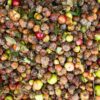Our Researcher Spotlight Series profiles DataLab affiliated faculty, staff, graduate students and postdoctoral scholars across disciplines to demonstrate the diversity of our community and highlight their amazing work.

M.V. Eitzel is a Postdoctoral Scholar with the Center for Community and Citizen Science at Davis and co-leads the MPA Watch project with Ryan Meyer. M.V. directs the computational aspects of the analysis. When she’s not rock-climbing or writing speculative fiction, she’s working to dismantle barriers to community data use and utilizing data science in the pursuit of improved social and environmental outcomes.
M.V.’s career with UC Davis started when she was an undergraduate, when she received a degree in Physics in the early 2000s. For her Master’s in geophysics, she studied seismic noise, and during her PhD, she worked with forest inventory data and historical aerial imagery to understand shifts in California tree population and community dynamics. Since then, she has moved toward participatory and community-based work. “It’s become clearer and clearer to me that participatory science is critical to addressing the pressing concerns of injustice and environmental harm that seem to saturate our world now,” she states.
The MPA Watch project is just that: the program utilizes data gathered by trained volunteer surveyors to to track how humans use the California coast inside and outside Marine Protected Areas (MPAs). The program “demonstrates the role of participatory science in helping to manage natural resources,” M.V. explains. Using the dataset from MPA Watch, the project’s analysis helps “reveal patterns in coastal use and impacts of protecting marine areas on human activities.” M.V. says she is “thrilled to be able to explore what we can do with these data and models,” even despite the limitations of working with such datasets. The data gathered from participatory science projects is often extraordinarily complex, which makes it more difficult to use the data for decision making and communication of results. This is where data science is useful: these techniques “can often open up these complex datasets to new understanding and interpretation,” she notes. And aside from the data itself, M.V. believes that data scientists have a unique opportunity when working with communities like those represented by MPA Watch. “Data scientists can help to reduce barriers to the use of the data—and can help share it back with the people who did the labor of getting it!—if they have the training in how to work with communities and the public at large.” This is, as she explains, because “data science, no matter how you define it, is not magic. Humans are still designing the tools, and humans still have to interpret the results.”
Given that my time is spent on a combination of data analysis, relationship building with communities, and project management, DataLab’s support on the modeling and computational components of the projects is invaluable.
When the project is completed, M.V. hopes the team can bring the results back to the volunteer surveyors who gathered the data as well as the many other partner agencies who are involved in the program and the protection of California’s coast, such as the Department of Fish and Wildlife. It’s important to M.V. and the entire MPA Watch project team to “improve the availability of the insights from the data to the people who do the labor of collecting the data and the people who need to make decisions based on them.”
For more from M.V. on ethical and transparent data science practices for improving modeling processes and making positive change in the field, read her Modeler’s Manifesto here.





